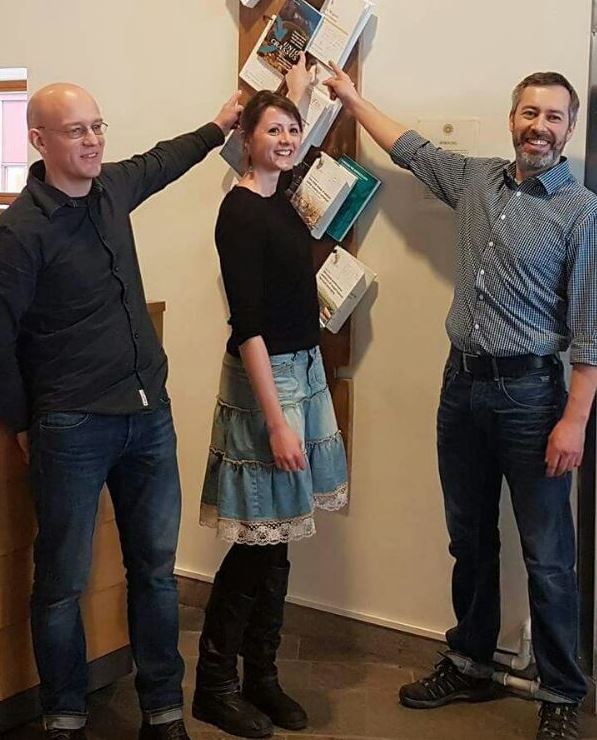
According to tradition, Lea Schneider (center) last week nailed her thesis to the wall, at the entrance to Karlstad University. On the photo are also Martin Österling (supervisor) and Reine Lundin (dean).
On February 24, Lea Schneider, will defend her PhD-thesis “Conservation ecology of the thick-shelled river mussel Unio crassus – the importance of parasite-host interactions”. In the abstract Lea Schneider writes: “Unionoid mussels are globally threatened and their conservation requires species-specific knowledge on their ecology and parasite-host interaction. Unio crassus is one of Europe’s most threatened unionoid species and has a temporary obligate parasitic life stage (glochidia) on fish. A lack of suitable hosts is probably a major limitation for mussel recruitment, but host species composition, suitability and availability in time and space have yet to be fully explored. This thesis examines different aspects of the host fish species, including their composition, suitability and ecological importance, in relation to U. crassus, using both field and laboratory studies. The effects of mussel and host density on mussel reproductive potential were considered, as were aspects of evolutionary adaptations between mussels and fish and how climate change may affect their interaction.
The results show that U. crassus is a host generalist, parasitizing a variety of fish species. Host suitability and density, which varied among fish species and rivers, affected the level of glochidia encapsulation, hence mussel reproductive potential, more so than the density of mussels taking part in reproduction. Ecologically important hosts included both highly suitable primary hosts, and less suitable hosts that were highly abundant. Whether or not U. crassus has specific adaptations to its hosts to enhance juvenile transformation remains unclear. No distinct pattern of local adaptation was found, nor was there an effect of host fish presence on the timing of glochidia release by adult mussels. Instead, temperature played a major role, with results suggesting that changes in spring water temperature regimes can cause temporal and spatial mismatches in the mussel-host interaction. This thesis indicates that investigations of local mussel-host interactions help in identifying mechanisms important for unionoid conservation management and prioritization.”
The defense will take place on February 24 at 10:15 in room 1B309 (Sjöströmsalen) at Karlstad University. The frame of the thesis is available online here.
For the defense, Caryn Vaughn (University of Oklahoma, USA) is the opponent, and Leonard Sandin (Swedish University of Agriculture), Niklas Janz (Stockholm University, Sweden), and Annie Jonsson (University of Skövde, Sweden) constitute the grading committee (betygskommitté).
In the afternoon (from 13:30 onwards) the day before the defense (Feb 23), seminars related to the thesis will be given in Room 5F416 at Karlstad University. Here Caryn Vaughn will present on “Consumer aggregations act as hotspots of ecosystem function and services in rivers”, Niklas Janz on “What is host range?”, and Leonard Sandin on “Evaluation of ecological restoration in Swedish streams – some results from the EKOLIV project”.
Everyone is welcome to attend both the PhD-defense and the seminars.


